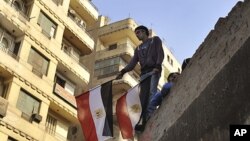Field Marshall Hussein Tantawi, who head's Egypt's ruling military council, met with top political figures Mohamed ElBaradei, the opposition leader and former International Energy Agency head and former Arab League chief Amr Moussa Saturday, as tensions remain high in Cairo's Tahrir Square.
Egyptian government TV reported that Field Marshall Tantawi met separately with Amr Moussa and former International Atomic Energy Agency head Mohamed ElBaradei Saturday, but there was little information about what was discussed.
The meetings came as several thousand mostly young protesters continued to demonstrate in Cairo's Tahrir Square. Protesters are calling for the dismissal of Kamal el-Ganzouri, who was chosen Friday to form a new interim government. He was once prime minister in the government of former President Hosni Mubarak.
Arab satellite channels reported that Mr. Ganzouri held discussions with various political leaders as he tried to form his new government. Al Arabiya TV, quoting the head of Egypt's security forces, said that Mr. Ganzouri plans to name a new interior minister in the wake of recent violence.
Earlier Saturday, a young man was killed when he was hit by a police vehicle. Several others were wounded after skirmishes with police on a side street near Tahrir Square. Protesters threw rocks and paving stones at security forces, who fired teargas to drive them back. Egyptian officials said the police vehicle incident was an accident.
The protesters had camped out overnight in front of the prime minister's office to try and prevent Mr. Ganzouri from entering the compound. The crowd chanted slogans calling on both the ruling military council and Mr. Ganzouri to resign.
Meanwhile, the head of Egypt's high electoral council told journalists that the first round of parliamentary elections scheduled for Monday would go ahead as planned.
Said Sadek, who teaches political sociology at the American University in Cairo, says the current atmosphere in the country will make the voting process difficult, at best:
"The atmosphere is very unfriendly for the voters. To have a legitimate election, you need to have enough security for the average voter not to feel threatened," Sadek said. "The confrontations that happened in the last few days looked like it was instigated by over-reaction by the interior ministry and the government."
In the streets of Cairo, opinion appeared to be divided over the feasibility of holding elections as scheduled. A middle-aged woman named Amal told VOA that the elections were likely to be the “most chaotic and flawed in the history of Egypt,” while a young man named Hossam insisted “it would be a mistake to postpone the vote.”
Egypt's Top Military Man Meets With Political Leaders




